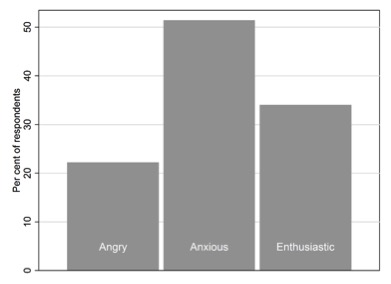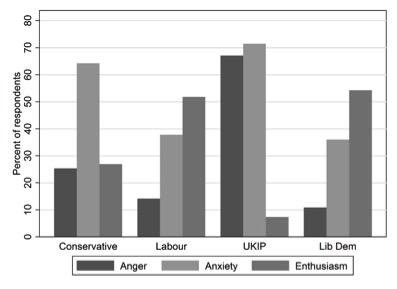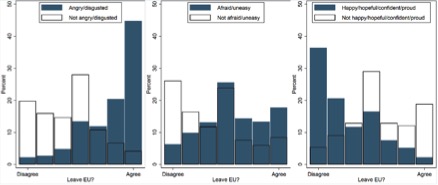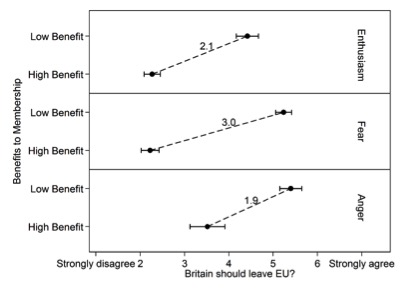This is a guest post by Markus Wagner and Sofia Vasilopoulou. Markus is an associate professor in quantitative methods at the University of Vienna. Sofia is a lecturer in politics at the University of York.
It is striking how prominent emotions were in popular reactions to Brexit. Those who supported Leave were understandably happy and enthusiastic about the result. Those who supported Remain – and in particular EU citizens in Britain – reported feeling sad, angry and afraid. According to a survey carried out by a project at the LSE, almost half of voters aged 18 to 24 ‘cried or felt like crying’ after the result. In interviews, EU nationals reported being ‘disgusted’ with the result, while others said they felt angry at racist incidents or sad that their future place in the UK was in doubt. Rarely do political events lead to such outpourings of emotions.
People reacted emotionally to the result, but were emotions also important for how they voted in the first place? Our research shows that people did report feeling different emotions when thinking about the EU before the referendum: being a member of the EU made people angry, anxious, uneasy or hopeful.
For those convinced that the European Union was holding Britain back, the fact that Britain was still a member made them angry. This was reflected in how the media reported on the referendum. For instance, following Cameron’s draft EU deal negotiation in early February, the Daily Mail talked about ‘a great delusion’ and ‘selling the country’, and the Sun asked ‘Who do you think you are kidding, Mr Cameron?’. The other dominant emotion before the referendum was anxiety, epitomized by the so-called ‘Project Fear’. In truth, there was anxiety on both sides of the debate: for Leave voters, there was the fear created by economic stagnation, migration and globalisation, while Remain voters were wary of the uncertainty and risks that would result from leaving the EU. Finally, many would argue that the Remain camp did not manage to instil hope and enthusiasm about the European ideal.

Note: Respondents were asked to choose up to four emotions from a list of nine: two for anger( angry, disgusted), two for anxiety (afraid, uneasy), four for enthusiasm (happy, confident, proud, hopeful) and indifferent.
We asked voters about their emotions surrounding the EU in a survey carried out online in April 2015 by Research Now among 3000 citizens chosen to be representative of the British population. Specifically, we asked respondents how they felt about Britain’s membership of the European Union. Negative emotions predominated: 51 per cent said they felt uneasy or afraid, and 23 per cent even said that they were angry or disgusted. In contrast, just over 30 per cent chose an enthusiastic emotion such as hopeful, proud, confident or happy. Only 25 per cent stated that they were indifferent when thinking about the EU.
Broken down by party affiliation, Conservative party supporters were the exception in that anxiety was their defining emotion, much more so than anger and enthusiasm. While UKIP supporters also had high levels of anxiety, they were perhaps unsurprisingly also by far the angriest set of voters. Predictably, Liberal Democrat supporters tended to feel most enthusiastic about Britain’s EU membership and reported very low scores on anger. Labour voters were the next most positive group and strikingly similar to Lib Dem voters in their emotional profile.

Note: Respondents assigned to a party based on whether they consider themselves to be ‘close’ to the party.
Is it a bad thing that emotions entered the Brexit debate? It is sometimes argued that mixing emotions and politics is to be avoided, and that it would be best if we could just form opinions neutrally, building on a fact-based cost-benefit analysis. However, pursuing such an emotionless state is probably an illusion: emotions are always part of how we think and feel, and psychologists such as Antonio Damasio even argue that they enable us to take good decisions. If emotions are an unavoidable part of people’s decision-making processes, then we need to understand how emotions shape debates and decisions, including in the upcoming referendum.
Our survey also shows how these emotions affect how Britons felt about the prospect of Brexit. To simplify, anger makes us want to approach threats and remove them, while fear makes us risk-averse, cautious and open to compromise, and enthusiasm leads us to favour the status quo. Applied to Brexit, voters angry about the EU were more likely than fearful voters to want Britain to leave the EU, with enthusiastic voters unsurprisingly the most likely to want to stay in the Union. However, we also asked about renegotiation, and those results show that fearful voters were more in favour of renegotiating the terms of EU membership than angry and enthusiastic voters. As expected, fearful voters are most cautious and open to compromise.

Note: Respondents were asked whether they agree or disagree with the statement ‘Irrespective of renegotiation, the UK should leave the EU’.
These effects hold if we account for voters’ many other views about the EU, so it is not that emotions simply reflect general attitudes: they have an independent influence on how we want our relationship with the EU to be, and their impact on our opinions appears to be at least as strong as, say, supporting UKIP or not.
Intriguingly, our results also show that ‘Project Fear’ might have worked: citizens’ emotional evaluations of the EU also affected how receptive they were to utilitarian, cost-benefit arguments about Brexit. Anxious citizens a more likely to think carefully about their decision and are generally more open to cost-benefit considerations. In contrast, the decisions of angry and enthusiastic citizens are quicker and more influenced by deep-seated convictions.

Note: Respondents were asked whether they agree or disagree with the statement ‘The UK has greatly benefited from being a member of the EU’
This can be seen in our final Figure, which shows support for leaving the EU, again on a 1 to 7 scale. However, this time we create two groups, based on whether respondents perceived many or few benefits to EU membership. Those who thought membership had few benefits were more likely to support leaving, irrespective of their emotional reactions. But at 3 points, the effect of doubting any benefits to membership is much larger for anxious citizens than for angry or enthusiastic citizens. For these voters, low perceived benefits only had a 2-point effect on wanting to leave. In other words: the effect of cost-benefit considerations was 50 per cent bigger for anxious than for angry or enthusiastic voters.
What does this tell us about the role played by emotions in the referendum result? Any ‘enthusiasm gap’ will have been important: since few people felt positive about the EU, this clearly damaged the prospects of the Remain campaign. Indeed, there may have been more enthusiasm and hope surrounding Leave than Remain: think of Boris Johnson’s call to celebrate ‘Independence Day’.
Turning to negative emotions, anger about the EU was an emotion that will have helped those campaigning for Leave. And most importantly, perhaps the Remain campaign was right to highlight the risks and uncertainty created by leaving the EU. The emotions elicited by such arguments will have helped the campaign if we accept that the balance of objective arguments supported the Remain camp. However, perhaps the Leave campaign found an effective counter-strategy by clearly labelling this strategy as ‘Project Fear’. Emotions are important in campaigns and can even improve the quality of voters’ decisions, but they are not an easy and straightforward tool to use, and politicians employ them at their peril.


